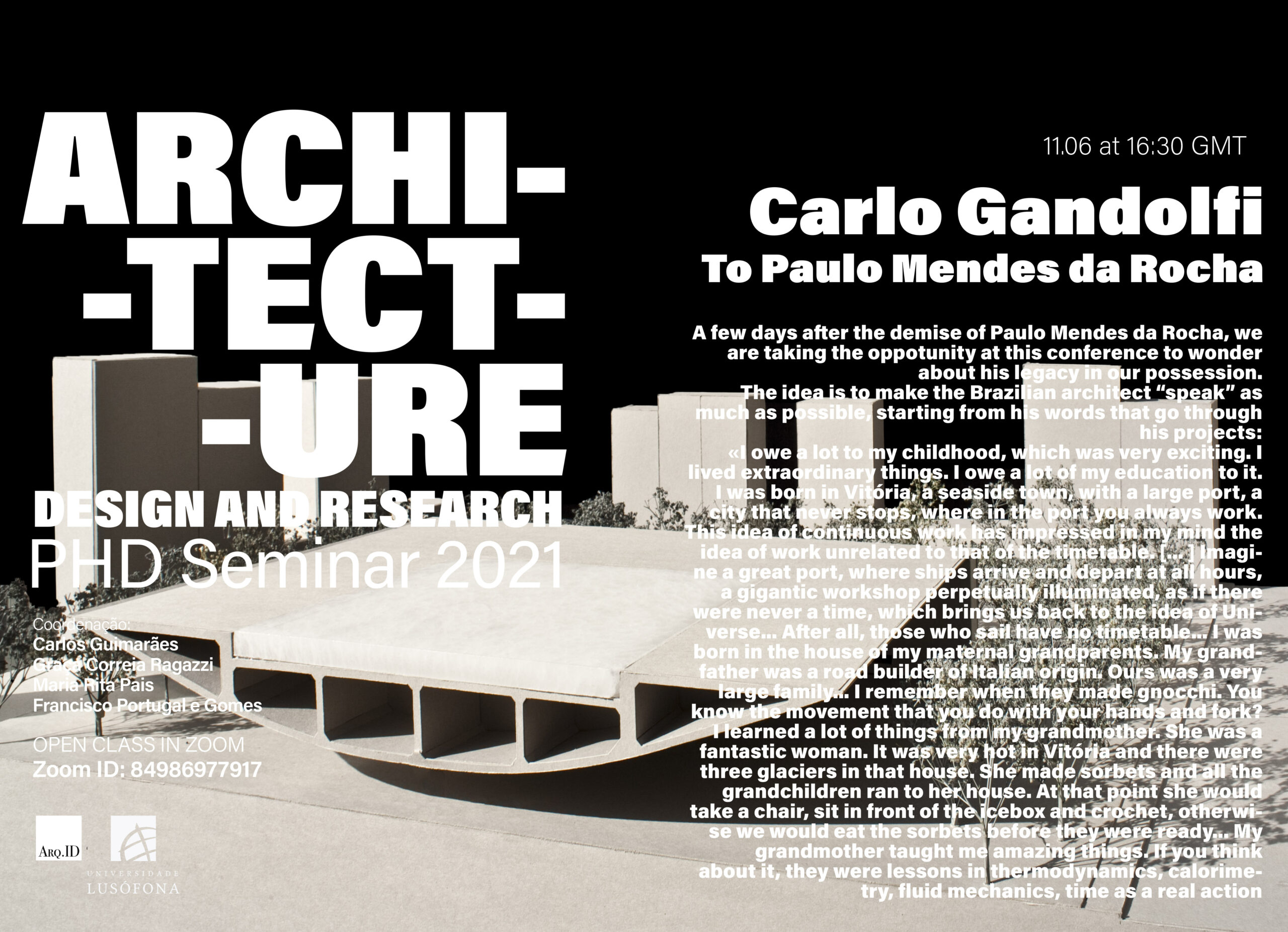Seminar: Carlo Gandolfi – “To Paulo Mendes da Rocha”
Docomomo International would like to share the seminar “Architecture: Design and Research” with the subtitle “Carlo Gandolfi – ‘To Paulo Mendes da Rocha'”, organized by the Architecture Departments of Lusófona University of Lisbon and Oporto, which will be held this friday, 11th June 2021 at 4.30 pm (GMT+1).
Please, feel invited to participate:
Zoom (class): https://videoconf-colibri.zoom.us/j/84986977917
“A few days after the demise of Paulo Mendes da Rocha, we are taking the oppotunity at this conference to wonder about his legacy in our possession.
The idea is to make the Brazilian architect ‘speak’ as much as possible, starting from his words that go through his projects:
‘I owe a lot to my childhood, which was very exciting. I lived extraordinary things. I owe a lot of my education to it. I was born in Vitória, a seaside town, with a large port, a city that never stops, where in the port you always work. This idea of continuous work has impressed in my mind the idea of workunrelated to that of the timetable. [… ] Imagine a great port, where ships arrive and depart at all hours, a gigantic workshop perpetually illuminated, as if there were never a time, which brings us back to the idea of Universe… After all, those who sail have no timetable… I was born in the house of my maternal grandparents. My grandfather was a road builder of Italian origin. Ours was a very large family… I remember when they made gnocchi. You know the movement that you do with your hands and fork? I learned a lot of things from my grandmother. She was a fantastic woman. It was very hot in Vitória and there were three glaciers in that house. She made sorbets and all the grandchildren ran to her house. At that point she would take a chair, sit in front of the icebox and crochet, otherwise we would eat the sorbets before they were ready… My grandmother taught me amazing things. If you think about it, they were lessons in thermodynamics, calorimetry, fluid mechanics, time as a real action ingredient and crochet and its code, as a measure of time: it didn’t look at the watch, it sewed for a while. My father was an engineer of Baian origin, raised in Rio de Janeiro. He was in charge of hydraulic engineering. I grew up seeing the ingenuity of things, the possibility of transforming them. I realize that all this has affected my point of view on design, on the relationship between idea and “thing”. Man can transform the beauty that already exists into a beauty desired and necessary for there to be life and build cities… there is a relationship between natural growth and human ingenuity.'”
The idea is to make the Brazilian architect ‘speak’ as much as possible, starting from his words that go through his projects:
‘I owe a lot to my childhood, which was very exciting. I lived extraordinary things. I owe a lot of my education to it. I was born in Vitória, a seaside town, with a large port, a city that never stops, where in the port you always work. This idea of continuous work has impressed in my mind the idea of workunrelated to that of the timetable. [… ] Imagine a great port, where ships arrive and depart at all hours, a gigantic workshop perpetually illuminated, as if there were never a time, which brings us back to the idea of Universe… After all, those who sail have no timetable… I was born in the house of my maternal grandparents. My grandfather was a road builder of Italian origin. Ours was a very large family… I remember when they made gnocchi. You know the movement that you do with your hands and fork? I learned a lot of things from my grandmother. She was a fantastic woman. It was very hot in Vitória and there were three glaciers in that house. She made sorbets and all the grandchildren ran to her house. At that point she would take a chair, sit in front of the icebox and crochet, otherwise we would eat the sorbets before they were ready… My grandmother taught me amazing things. If you think about it, they were lessons in thermodynamics, calorimetry, fluid mechanics, time as a real action ingredient and crochet and its code, as a measure of time: it didn’t look at the watch, it sewed for a while. My father was an engineer of Baian origin, raised in Rio de Janeiro. He was in charge of hydraulic engineering. I grew up seeing the ingenuity of things, the possibility of transforming them. I realize that all this has affected my point of view on design, on the relationship between idea and “thing”. Man can transform the beauty that already exists into a beauty desired and necessary for there to be life and build cities… there is a relationship between natural growth and human ingenuity.'”





